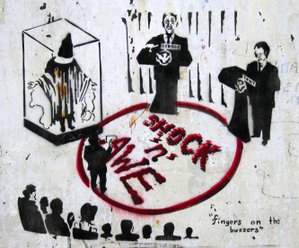Lawmakers Back Use of Evidence Coerced From Detainees :

By ERIC SCHMITT and TIM GOLDEN
12/17/05 "New York Times" -- -- WASHINGTON, Dec. 16 - House and Senate negotiators agreed Friday to a measure that would enable the government to keep prisoners at Guantánamo Bay indefinitely on the basis of evidence obtained by coercive interrogations.
The provision, which has been a subject of extensive bargaining with the Bush administration, could allow evidence that would not be permitted in civilian courts to be admissable in deciding whether to hold detainees at the American military prison in Guantánamo Bay, Cuba. In recent days, the Congressional negotiators quietly eliminated an explicit ban on the use of such material in an earlier version of the legislation.
The measure is contained in the same military policy bill that includes Senator John McCain's provision to ban the cruel, inhuman and degrading treatment of detainees in American custody worldwide. Mr. Bush reluctantly embraced Mr. McCain's ban on Thursday. The full House is expected to approve the compromise bill soon, with the Senate to follow in the next few days, Congressional officials said.
The juxtaposition of the seemingly contradictory measures immediately led lawyers for Guantánamo prisoners to assert that Congressional Republicans were helping to preserve the utility of coercive interrogations that senior White House officials have argued are vital to the fight against war against terror.
While the measure would allow the Guantánamo prisoners to challenge in federal court their status as enemy combatants and to appeal automatically any convictions and sentences handed down by military tribunals in excess of 10 years, it would still prevent the detainees from asking civilian courts to intervene with the administration over harsh treatment or prison conditions.
Thomas B. Wilner, a lawyer who represents a group of Kuwaiti detainees at Guantánamo Bay, said in an interview that the new language would render the McCain restrictions unenforceable at the Cuban prison. "If McCain is one small step forward, enactment of this language would be two giant steps backwards," Mr. Wilner said.
Two of the main Senate sponsors of the measure, Lindsey Graham, Republican of South Carolina, and Carl Levin, Democrat of Michigan, defended the changes made to the language that the Senate passed last month, 84 to 14.
Mr. Graham acknowledged the measure's intention to make it possible to use information obtained by coercive interrogation techniques in military panels that evaluate whether detainees at Guantánamo are being rightfully held as "enemy combatants." He argued that the techniques were not abusive.
He also said that under his measure, the panels would weigh the value of the intelligence gained from an interrogation against a judgment on whether the statement was coerced. He said in a telephone interview with reporters that the amendment would promote "a balanced approach." A similar rule now applies in the military commissions that have been established to prosecute terror suspects at Guantánamo.
Human rights advocates criticized Mr. Levin, the chief Senate Democratic negotiator, for agreeing to restrict further the legal rights of Guantánamo detainees. Mr. Levin suggested that he had settled for the less damaging of two bad outcomes, saying he had deflected more onerous provisions that House Republicans wanted, including a demand that interrogators who abused prisoners be granted immunity from prosecution. Mr. Levin added in a telephone interview, "I don't think courts will allow coerced evidence in any proceeding."
The Bush administration has repeatedly considered - and rejected - explicitly prohibiting the use of evidence obtained by torture in the military commissions. Most recently, the issue was a major part of a lengthy internal debate over new rules for the tribunals that were promulgated on Aug. 31 in response to longstanding criticism in the United States and overseas that the tribunals are unfair.
Several officials familiar with the internal discussions said State Department officials and some senior Defense Department aides had strongly advocated an explicit ban on the use of evidence obtained by torture in a series of interagency discussions that began last December.
At one point in that process, the Pentagon official in charge of the tribunals, Maj. Gen. John D. Altenburg Jr., who is now retired, proposed barring any "confession or admission that was procured from the accused by torture," according to parts of a draft document read to a reporter. The rule defined torture as any act "specifically intended to inflict severe physical or mental pain and suffering."
The ban was also championed by the counselor of the State Department, Philip D. Zelikow, two officials said. The deputy defense secretary, Gordon R. England, also supported the ban in meetings on the revised commission rules, as did some senior military officers, said a spokesman for Mr. England, Capt. Kevin Wensing.
But such a prohibition was opposed by other officials involved in the debate, including David S. Addington, who was then Vice President Dick Cheney's counsel and is now his chief of staff. A spokesman for the vice president said Mr. Addington would have no comment on his reported role in the policy debates.
Since the drafting of the presidential order that established the commissions on Nov. 13, 2001, White House officials have sought to give the commissions wide latitude to consider evidence that would be inadmissible in civilian courts.
Mr. Addington, who was a primary architect of the presidential order, argued in the debates earlier this year that by explicitly prohibiting evidence obtained by torture, the administration would raise an unnecessary red flag. suggesting at least implicitly that prisoners in American custody were, in fact, being tortured, officials said.
Justice Department officials involved in the debates contended that such a prohibition was not necessary because the matter was already covered by the Convention Against Torture and Other Cruel, Inhuman and Degrading Treatment or Punishment, a treaty adopted by the United Nations more than two decades ago and ratified by the United States in 1994.
Copyright 2005The New York Times Company
Link Here




0 Comments:
Post a Comment
<< Home